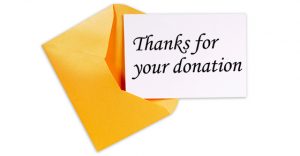 Holiday-inspired generosity and the desire to reduce tax liability makes the end of the year a busy time for charitable giving. According to Network for Good and other sources, approximately 30% of charitable gifts are made in December alone. For nonprofits, an important part of processing these donations is sending thank-you letters that acknowledge gifts. To ensure your letters contain everything they should, here’s a refresher course.
Holiday-inspired generosity and the desire to reduce tax liability makes the end of the year a busy time for charitable giving. According to Network for Good and other sources, approximately 30% of charitable gifts are made in December alone. For nonprofits, an important part of processing these donations is sending thank-you letters that acknowledge gifts. To ensure your letters contain everything they should, here’s a refresher course.
The basics and more
The IRS mandates that taxpayers substantiate single contributions of $250 or more with written acknowledgments from donation recipients. You can help build good relationships with donors by providing them with all of the information they need in a timely manner.
Along with the basics, such as your nonprofit’s name, the amount, and date of the donation, make sure your acknowledgment letters state whether donors received anything in exchange for their gifts. For example, you might state that no goods or services were provided to the donor. If donors did receive something, you may need to provide a description and good faith estimate of the value of the goods or services. Religious organizations may want to say that any goods or services provided consisted entirely of intangible religious benefits.
If your state requires it, also include a tax-exempt status statement with your organization’s Employer Identification Number. And if a donor made a noncash contribution, briefly describe the contribution in your acknowledgement letter.
Details, details
Referring to such acknowledgements as “letters,” is, of course, a convention. The IRS leaves it up to nonprofits to decide on the appropriate medium for donation acknowledgments, be it a letter, postcard, e-mail, or text. Donation letters must be sent contemporaneously with the donation. According to the IRS, this means that supporters receive them by the earlier of:
- The date they actually file their income tax returns for the year of the contribution, or
- The due date of the return.
However, you’ll probably earn greater donor goodwill by sending acknowledgments within a few days of receiving a donation.
Don’t make a habit of it
You probably won’t lose your tax-exempt status for forgetting to send one donor acknowledgment letter. But you don’t want to make a habit of it or force donors to follow up with you to get the tax information they need. Contact us if you need help with tax or compliance issues. © 2020

